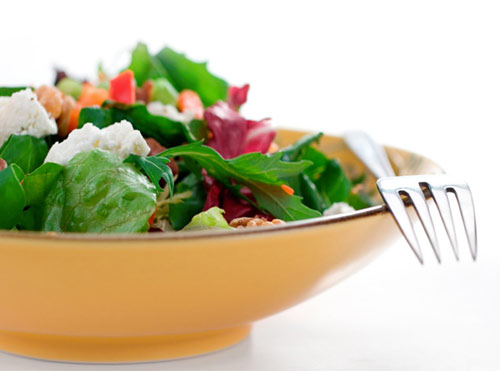當(dāng)前位置: Language Tips> 英語(yǔ)學(xué)習(xí)專欄
分享到
青少年應(yīng)該如果正確選擇飲食才會(huì)健康呢?讓我們來關(guān)注一下吧……

李殊 選注
Ask any group of teenagers in the UK what they most like to eat, and foods like pizzas, curries, pasta, burgers and chips are bound to get a mention—and many young people would probably also list hanging out at the local fast-food restaurant as one of their favourite pastimes.
But what teenagers like to eat is not necessarily what they should be eating. According to the National Diet and Nutrition Survey, far too many young people in the UK between the ages of 4 and 18 consume too much fat, sugar and salt in their diet and take in too many calories. Meanwhile their intake of starchy carbohydrates(含淀粉的碳水化合物), fibre, iron, vitamins and calcium too low.
For a growing body, eating foods containing plenty of calcium, such as milk, yoghurt and cheese, is particularly important as calcium is essential for the development of healthy, strong bones. Similarly, foods that are rich in iron are good for young, rapidly developing bodies, so red meat, bread, green vegetables, dried fruit and fortified breakfast cereals are also recommended.
It is during our teenage years that lifestyle habits can become entrenched, so it is crucial that young people are educated about what foods are good for them. In 2005, and in an attempt to change eating habits and open teenagers’ minds to new flavours and new tastes, celebrity chef Jamie Oliver launched a “Feed Me Better” campaign. As part of a television series, “Jamie’s School Dinners,” he worked with teachers and cooks in a number of schools across the UK to provide more healthy, nutritious school meal options. Although there was initial resistance from some teenagers and parents, the campaign was generally hailed as a huge success and helped to influence governmental policy on nutritional standards for school meals.
No one expects to end the teenage love affair with fast and junk food but, hopefully, if projects like “Feed Me Better” and the Government’s own “Change4Life” campaign continue to give out the right messages, more young people will understand the importance of balancing occasional treats with healthier food options.
Vocabulary
1. curry: 咖喱食品;pasta: 意大利面;be bound to: 肯定,一定要;hang out: 在餐廳就餐;pastime: 消遣,娛樂。
2. diet: 日常飲食;calorie: 卡路里(食物所產(chǎn)生的熱量單位)。
3. starchy carbohydrates: 含淀粉的碳水化合物;fibre: 纖維;calcium: 鈣。
4. yoghurt: 酸奶。
5. fortified: (營(yíng)養(yǎng))強(qiáng)化的。
6. entrenched: 確立的;crucial: 決定性的,關(guān)鍵性的。
7. celebrity chef Jamie Oliver: 英國(guó)的明星廚師杰米?奧立佛,他因擅長(zhǎng)使用有機(jī)食材,以及幫助改變英國(guó)學(xué)校中的飲食習(xí)慣而為人熟悉。
8. nutritious: 營(yíng)養(yǎng)價(jià)值高的。
9. initial: 起初的;resistance: 阻力,抵抗;hail: 贊揚(yáng),稱頌。
10. junk food: 垃圾食品;occasional: 偶爾的,特殊場(chǎng)合的;treat: 款待,招待。
(來源:英語(yǔ)學(xué)習(xí)雜志 編輯:丹妮)
上一篇 : 好廚師的化學(xué)公式
下一篇 : 無盡等待之美
分享到
關(guān)注和訂閱


口語(yǔ)
關(guān)于我們 | 聯(lián)系方式 | 招聘信息
電話:8610-84883645
傳真:8610-84883500
Email: languagetips@chinadaily.com.cn